
Rosen says he told Trump he would not allow the DOJ to do anything to overturn the election
Rosen says he told Trump he would not allow the DOJ to do anything to overturn the election
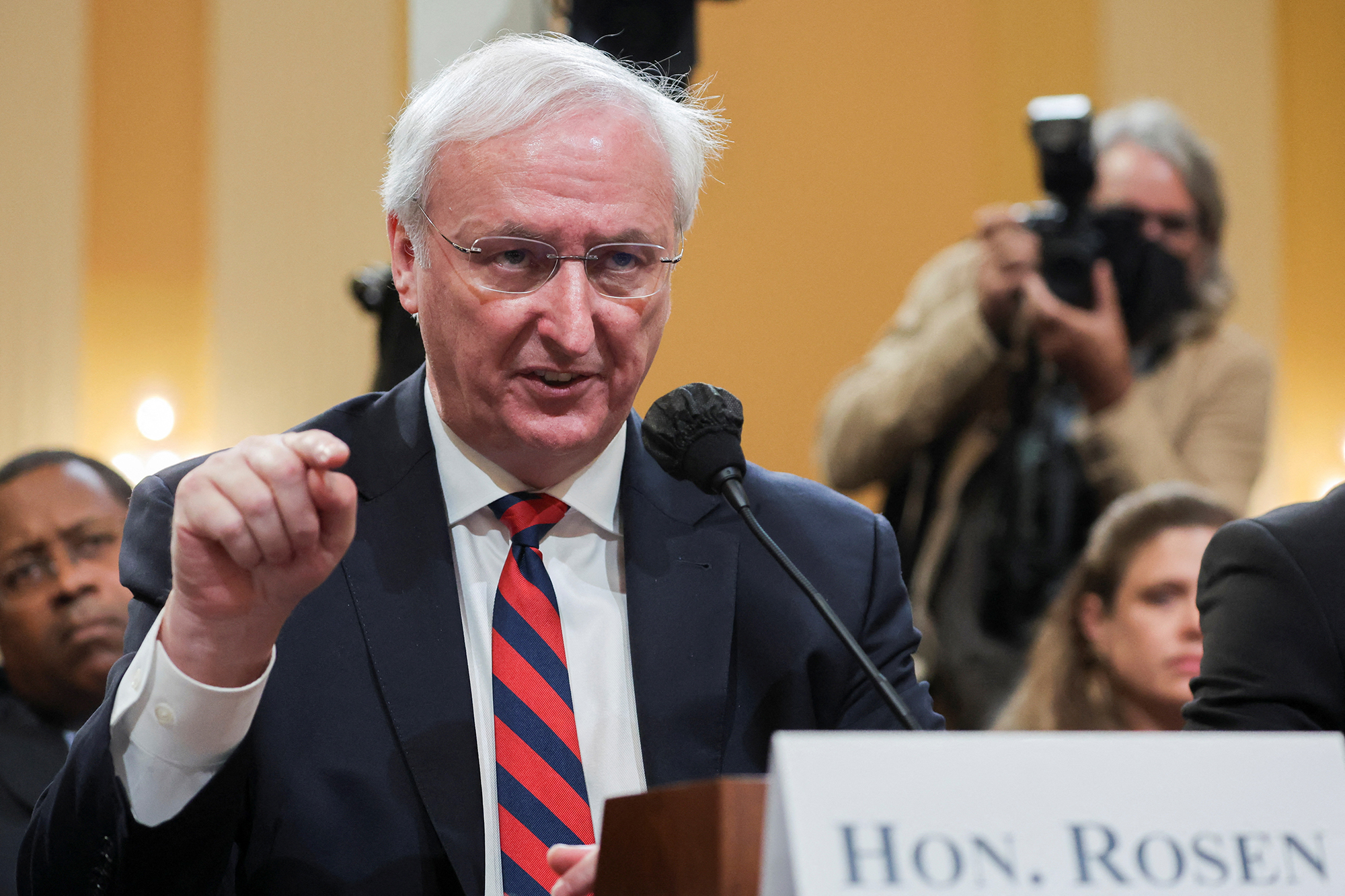
Jeffrey A. Rosen, the former acting attorney general, said he told then-President Donald Trump at a pivotal meeting in the Oval Office on Jan. 3, 2021, that he would not allow the Justice Department to do anything to give validity to false claims of election fraud, saying its “a good thing for the country.”
When he entered the meeting, Trump said “you don’t even agree with the claims of election fraud, and this other guy at least might do something,” Rosen testified, referring to Trump considering installing Jeffrey Clark, the department’s former top energy lawyer who had pushed Trump’s fraud claims.
Rosen told the committee he replied, “Mr. President, you’re right that I’m not going to allow the Justice Department to do anything to try to overturn the election. That’s true. But the reason for that is that’s what’s consistent with the facts and the law. That’s what’s required under the Constitution.”
“So that’s the right answer and a good thing for the country, and therefore, I submit it’s the right thing for you, Mr. President,” Rosen added.
He said Trump and other Justice Department and White House officials in the room were bringing up points in support of Rosen and critical of Clark.
Trump’s defense head called attache in Rome to investigate baseless election claim about Italian satellites
From CNN’s Zachary Cohen
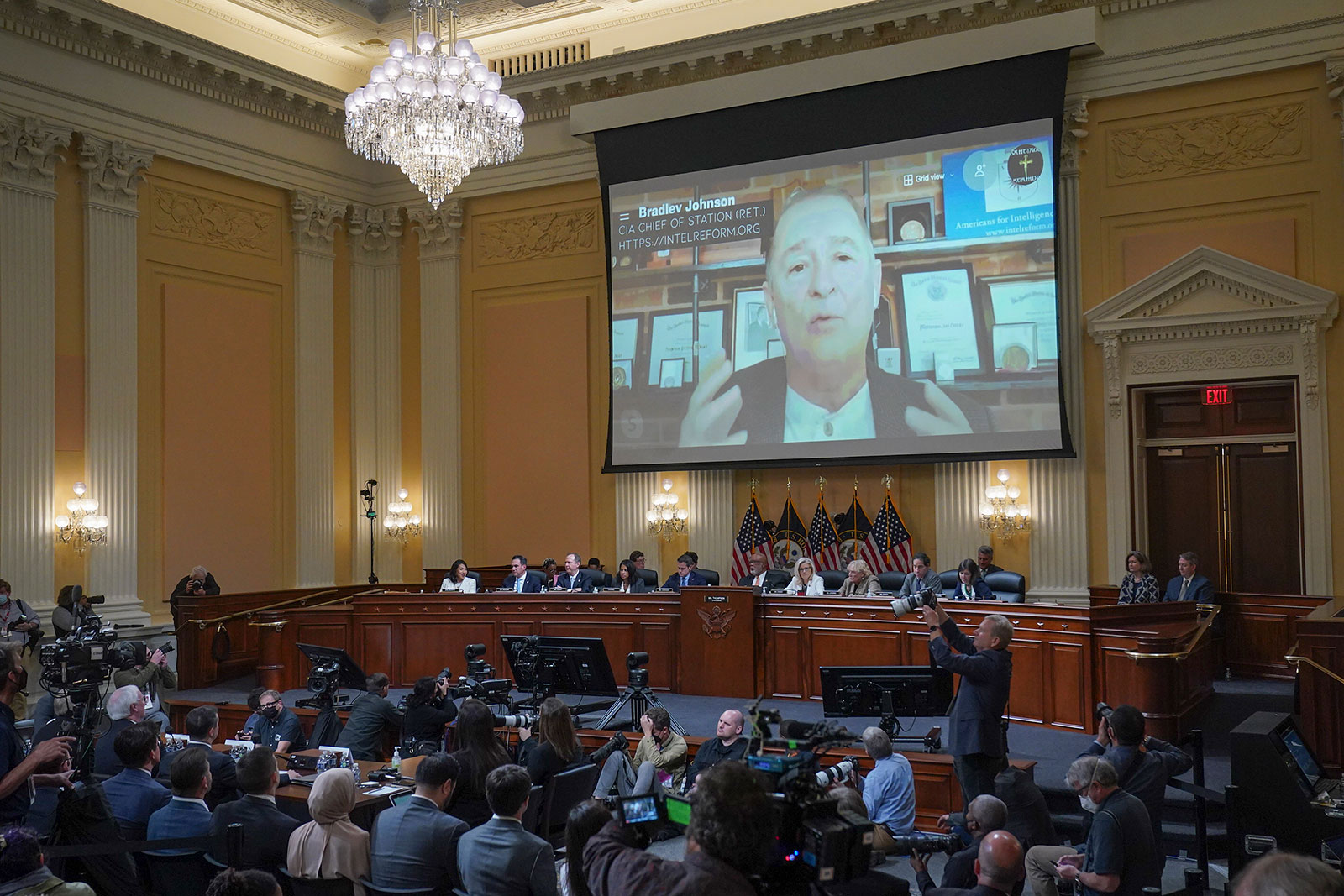
At the request of former chief of staff Mark Meadows, then-Defense Secretary Christopher Miller reached out to the defense attaché in Italy to investigate a baseless claim that an Italian satellite had switched votes from Donald Trump to Joe Biden, according to testimony at Thursday’s House Jan. 6 committee hearing.
The conspiracy theory, which CNN has previously reported was among those pushed Meadows pushed top national security officials to investigate, was characterized as “pure insanity” by former DOJ official Richard Donoghue, who was also asked to look into the claim.
After the DOJ refused to meet with the man who was pushing the baseless claim online, Meadows went to Department of Defense and asked Miller to follow-up on it.
“The ask for him was, can you call out to defense attaché Rome and find out what the heck’s going on? Because I’m getting all these weird crazy reports and probably the guy on the ground knows more than anything,” Miller told the committee during his closed-door interview, according to video of his deposition played Thursday.
Rep. Adam Kinzinger said Thursday that the committee confirmed a call was actually placed by Miller to the attaché in Italy to investigate the claim about Italian satellites.
Trump asked DOJ to seize voting machines from states, witnesses testify
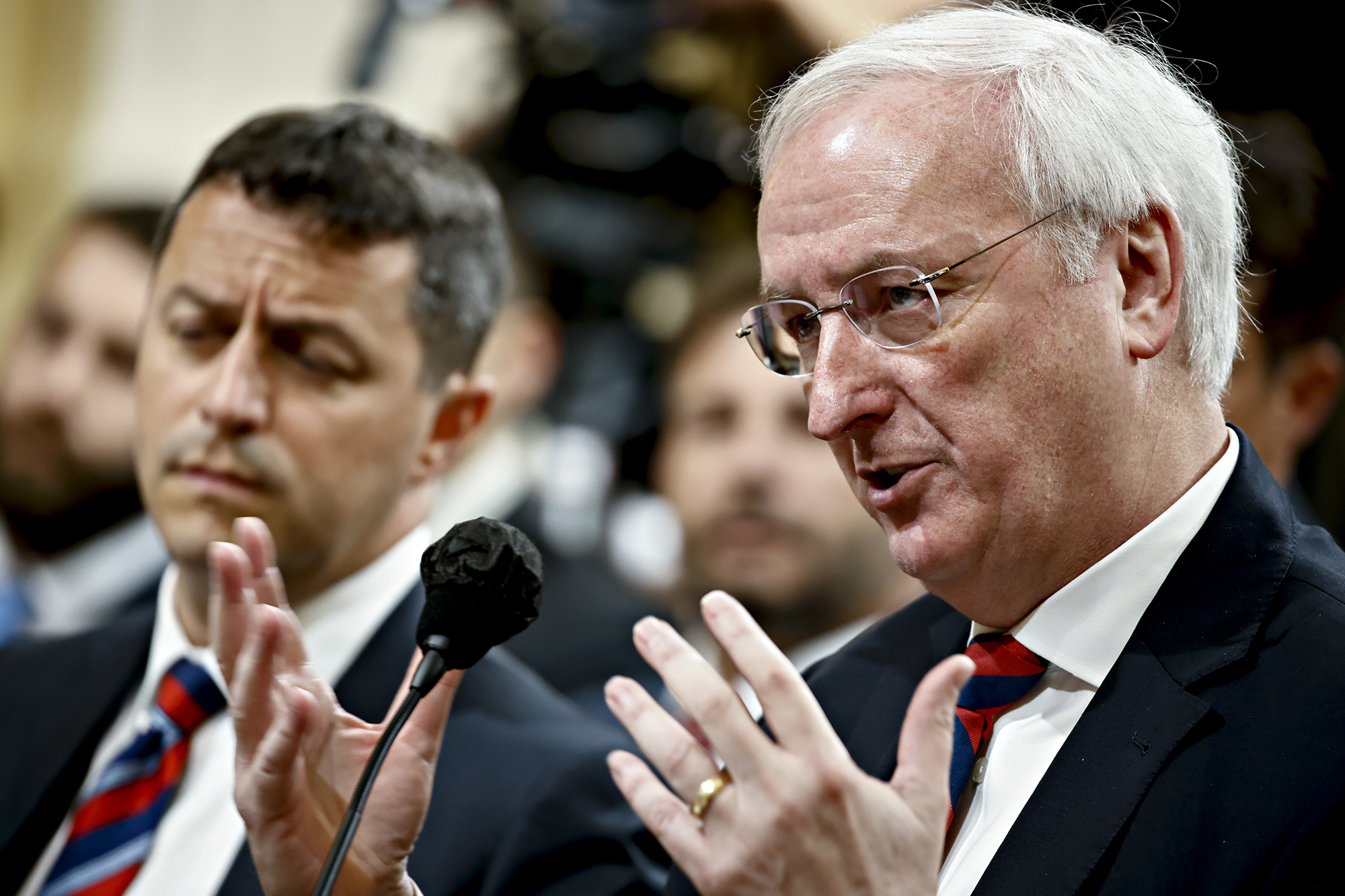
Former President Trump asked then-acting attorney general Jeffrey Rosen to seize voting machines from state governments in late December 2020, according to testimony from former DOJ official Richard Donoghue during Thursday’s hearing — a request Rosen testified the Justice Department had no legal authority to do.
“We had seen nothing improper with regard to the voting machines, and I told him that the real experts at that had been at DHS and had briefed us that they had looked at it and that there was nothing wrong with the voting machines. And so that was not something that was appropriate to do,” Rosen testified.
“I don’t think there was legal authority either,” Rosen added, responding to question from Rep. Adam Kinzinger that there was no “factual basis” to seize the machines.
Richard Donoghue, former acting deputy attorney general, said that Trump was “very agitated” when he was told the Justice Department would not take action of the voting machines.
At that point, according to Donoghue, Trump called Ken Cuccinelli at the Department of Homeland Security and told him that Rosen was saying it was DHS’s job to seize the machines, even though he was not saying that.
“Get Ken Cuccinelli on the phone,” Trump yelled to his secretary after DOJ officials told him that DHS had expertise in voting machines and determined there was nothing to warrant seizing them, according to former acting attorney general Jeffrey Rosen, who testified Thursday.
Rosen confirmed Thursday he never told Trump that DHS could seize voting machines. CNN has previously reported that Trump pushed DOJ and DHS to seize voting machines.
CNN has also previously reported that Trump allies drafted executive orders that would have had the military and DHS seize voting machines had they been signed by Trump – but they ultimately were not.
CNN’s Zachary Cohen contributed to this report.
There was no basis for special counsel to probe 2020 fraud, DOJ official says
From CNN’s Marshall Cohen
There was no legal basis to appoint a Justice Department special counsel to investigate voter fraud in 2020, even though President Donald Trump demanded it, a top department official testifiThursday.
Steven Engel, who was the head of the Justice Department’s Office of Legal Counsel, which provides legal advice to the executive branch, described the saga in testimony to the Jan. 6 select committee.
“It was not legally available,” Engel said.
CNN and other news outlets reported in December 2020 that Trump had floated the idea of naming Sidney Powell as a special counsel, but that was met with significant pushback from senior White House officials. Powell is a well-known conspiracy theorist who represented former Trump adviser Michael Flynn during his criminal trial, and has promoted fantastical and false theories of massive voter fraud.
The committee played a deposition clip of Powell describing Trump’s desire to appoint her to the post.
“He asked me to be special counsel to address the election issues and to collect evidence and he was extremely frustrated with the lack of, I would call it law enforcement, by any of the government agencies that are supposed to act to protect the rule of law in our republic,” she said in the video.
Then-Attorney General Bill Barr refused to appoint a special counsel, and after Barr resigned in December 2020, Trump continued pressing top Justice Department officials to name a special counsel, including Barr’s successor, Jeffrey Rosen, who also refused.
“Neither Barr nor Rosen believed (a special counsel) was appropriate or necessary in this case,” Engel said.
Rep. Adam Kinzinger, an Illinois Republican, who has been leading much of the questioning on Thursday, condemned Trump for even considering a special counsel.
“An investigation led by a special counsel would just create an illusion of legitimacy and fake cover for those who want to object” to the 2020 election, “including those who stormed the Capitol on Jan. 6,” he said.
Donoghue says he told Clark pushing election fraud claims was “nothing less” than the DOJ meddling in election
From CNN’s Katelyn Polantz
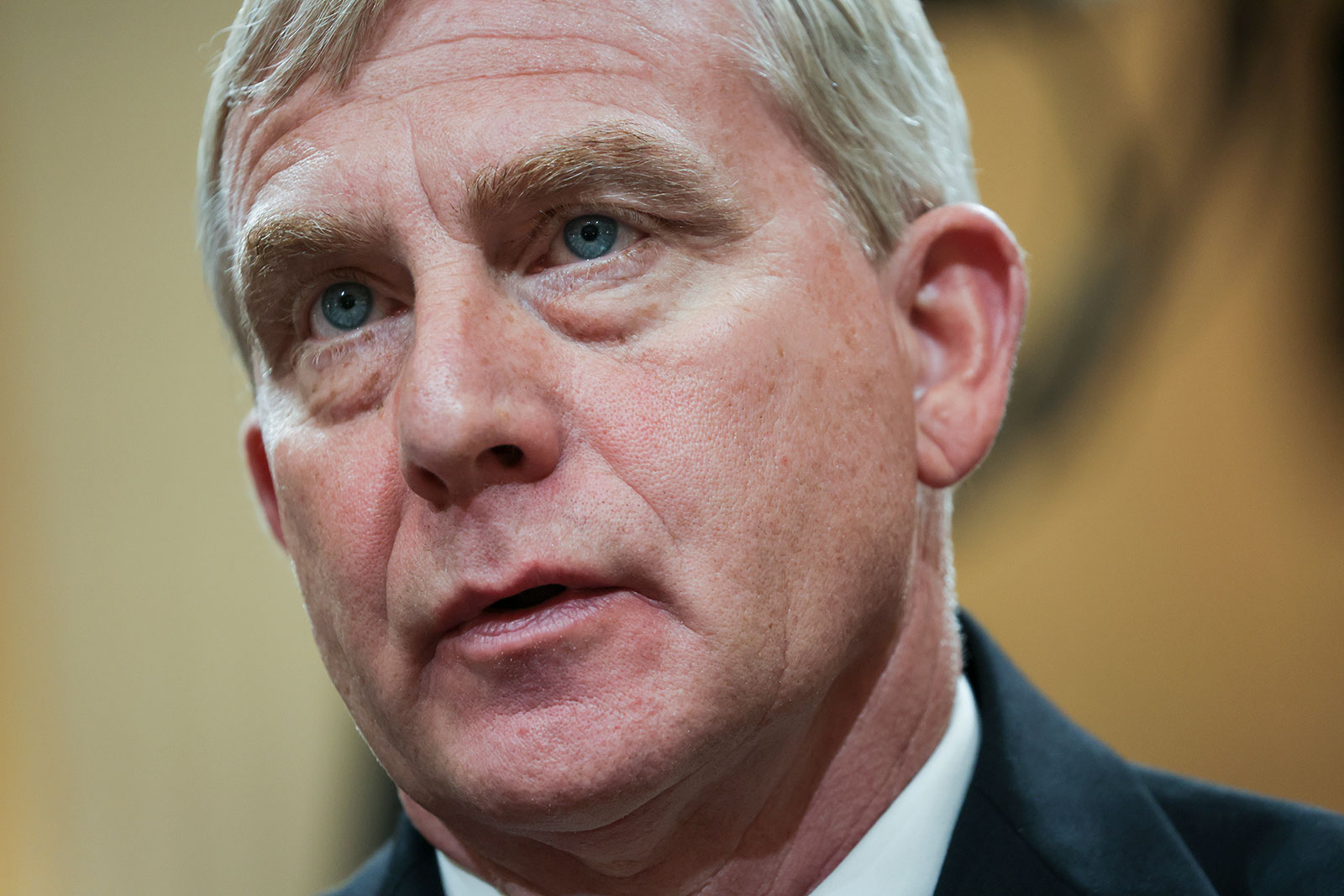
Former acting Deputy Attorney General Richard Donoghue recounted having multiple confrontations with DOJ official Jeffrey Clark, telling him that what he was proposing, in pushing election fraud claims, was “nothing less than the United States Justice Department meddling in the outcome of a presidential election.”
“It was a very contentious meeting,” Donoghue recalled during his sworn testimony on Thursday. “Yes, that was said amongst other things.”
Donoghue later confronted Clark again, and the top tier of DOJ officials continued to try to put an end to Clark’s insistence that the department be used to investigate nonexistent voter fraud. Another confrontation was on January 2, 2021, Donoghue said.
“He was defensive,” Donoghue said. “Similar to his earlier reaction when I said this was nothing less than the Justice Department meddling in an election, his reaction was, ‘I think a lot of people meddled in this election.’ So he kind of clung to that.”
Cheney highlights role of lawyer Ken Klukowski in assisting Jeffrey Clark and John Eastman
From CNN’s Holmes Lybrand
According to the House select committee, a lawyer named Ken Klukowski joined the Justice Department in mid-December 2020 and helped draft a letter urging Georgia state officials to take actions that would undermine the results of the election in the state as well as pressure Vice President Mike Pence to overturn the election.
Klukowski joined the Department of Justice “on Dec. 15 with only 36 days left until inauguration,” Vice Chair Liz Cheney said Thursday. “He was specifically assigned to work under Jeffrey Clark.”
According to Cheney, Klukowski helped draft a letter to Georgia state officials with Justice Department official Jeffrey Clark, repeating false claims of election fraud and asking the officials to convene a special session and consider approving a new slate of electors for the state.
Klukowski also worked with conservative lawyer John Eastman, who helmed the false theory that Pence could overturn the 2020 election results and was recommended in a December 2020 email to meet with Pence and his staff, Cheney said.
“This email suggests that Mr. Klukowski was simultaneously working with Jeffrey Clark to draft the proposed letter to Georgia officials to overturn their certified election,” Cheney said, “and working with Dr. Eastman to help pressure the vice president to overturn the election.”
Steven Engel is now answering questions. Here’s what to know about him.
From CNN’s Evan Perez and Ryan Nobles
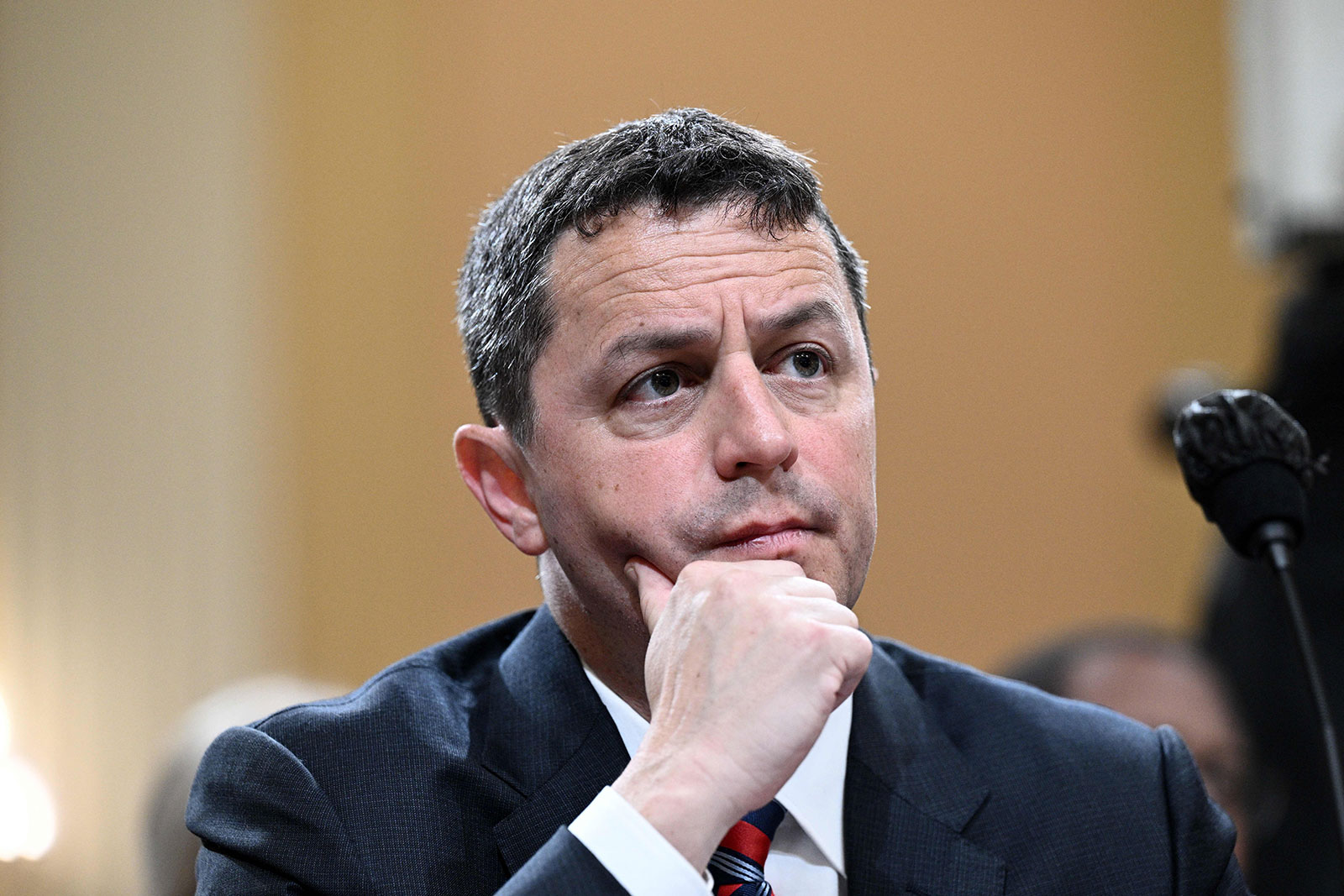
Steven Engel, the former assistant attorney general for the office of legal counsel, is testifying before the Jan. 6 House select committee.
The committee is focusing on former President Trump’s effort to pressure the Justice Department to challenge the election result.
Engel was a key witness at a pivotal meeting on Jan. 3, 2021, at the White House where Trump held a reality TV-show style contest over whether to fire acting attorney general Jeffery Rosen and install someone more amenable to run the Justice Department to support his election fraud claims. Rosen replaced former Attorney General William Barr.
The Senate Judiciary Committee, in an earlier investigation, found Engel told Trump at the meeting that he and other top officials would resign if he fired Rosen.
Some context: In a series of emails released by Democrats on the House Oversight Committee earlier this month, Richard Donoghue, the former deputy attorney general, told Engel that he wanted to meet with him “about some antics that could potentially end up on your radar,” signaling there was at least some concern that the Office of Legal Counsel would have to weigh in on potential issues.
The emails also included correspondence with Jeffery Clark, a Justice Department lawyer who tried to convince Trump to remove Rosen and use the DOJ to undo Georgia’s election results, which The New York Times reported in January. In the Jan. 1 email, Meadows asked Rosen to have Clark look into the alleged signature issues in Georgia, ahead of a meeting on Jan. 3 in which Trump heard directly from Clark and Rosen before ultimately choosing not to remove Rosen.
The hearing has resumed
The House select committee investigating the Jan. 6 insurrection at the US Capitol is back after taking a short break.
Thompson says Jan. 6 committee hasn’t decided how far to go to get Rep. Scott Perry’s testimony
From CNN’s Manu Raju
During the break, Rep. Bennie Thompson told CNN that the committee hasn’t decided how far to go to secure the testimony of Rep. Scott Perry, who has so far refused to comply with the committee’s subpoena.
“Well, you know, we’ve asked him to come. We will make a decision at some point on the next step,” the committee chairman said. Asked if he personally favored holding Perry in contempt, Thompson said, “Well, I would leave it up to the committee.”
Asked if he believed Perry had any criminal exposure, Thompson said, “Well, I think he was reporting — recommending somebody for a job. He recommended somebody that was not qualified. That’s up to him.”
Source: https://www.cnn.com/politics/live-news/january-6-hearings-june-23/h_15c70dc78d5c15b685c432d69f64cef8















